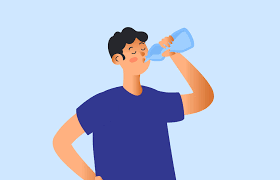Drinking more water, recognizing the importance of hydration, and maintaining proper fluid intake are essential habits for overall well-being. Water is often overlooked in our daily health routines, but it plays a vital role in almost every function of the human body. From regulating temperature and flushing toxins to supporting digestion and maintaining energy levels, hydration is the unsung hero of good health.
Why Hydration Matters More Than You Think
Our bodies are composed of about 60% water, and every cell, tissue, and organ requires water to function efficiently. The importance of hydration is evident in how it affects everything—from cognitive function to skin health and physical performance.
When we don't drink enough water, even mild dehydration can cause fatigue, headaches, dizziness, and poor concentration. Chronic dehydration may lead to more serious issues such as kidney stones, urinary tract infections, and even impaired heart and brain function.
The Science Behind Fluid Intake
Fluid intake is not just about quenching thirst. It involves consuming enough liquids to replace what the body loses throughout the day. We lose water through breathing, sweating, urinating, and bowel movements. The amount needed varies based on age, activity level, climate, and overall health. On average, adults should aim for 8–10 cups (about 2–2.5 liters) of water daily, although needs can vary.
Foods high in water content, such as fruits and vegetables, also contribute to fluid intake. Watermelon, cucumbers, oranges, and strawberries are great hydrating snacks. However, plain water remains the most effective and calorie-free source of hydration.
Benefits of Drinking More Water
Drinking more water consistently can bring noticeable improvements in how you feel and perform daily. Some of the key benefits include:
-
Improved Brain Function: Proper hydration enhances focus, alertness, and short-term memory. Even a small drop in hydration levels can impair mental performance.
-
Better Physical Performance: Whether you're an athlete or just trying to stay fit, water helps maintain energy, lubricate joints, and regulate body temperature.
-
Weight Management: Drinking water before meals can promote satiety, helping control calorie intake. Sometimes thirst is mistaken for hunger, leading to unnecessary snacking.
-
Detoxification: Water aids in flushing waste from the body through urine and sweat, keeping the kidneys functioning efficiently.
-
Healthy Skin: Dehydration often makes the skin look dry and dull. Proper hydration can improve skin texture and reduce the appearance of fine lines.
-
Digestive Support: Water is essential for breaking down food, absorbing nutrients, and preventing constipation.
Common Myths About Hydration
There are many myths around drinking more water and fluid intake. Let's debunk a few:
-
Myth: You only need water when you're thirsty.
Reality: Thirst is a late sign of dehydration. By the time you feel thirsty, your body may already be low on fluids. -
Myth: Coffee and tea dehydrate you.
Reality: While caffeine is a diuretic, moderate amounts of coffee or tea still contribute to your daily fluid needs. -
Myth: You can’t overhydrate.
Reality: While rare, drinking excessive water in a short time can lead to hyponatremia, a condition where blood sodium levels become dangerously low.
Tips to Stay Hydrated Throughout the Day
To prioritize the importance of hydration, consider building hydration into your daily habits:
-
Start your day with a glass of water: It jumpstarts your metabolism and compensates for fluid loss overnight.
-
Carry a reusable water bottle: Having water easily accessible encourages frequent sips.
-
Set reminders: Smartphone apps or simple alarms can help you stay on track with your fluid intake goals.
-
Flavor your water: Add natural ingredients like lemon, mint, or cucumber for a refreshing twist.
-
Hydrate before, during, and after exercise: Physical activity increases water loss through sweat.
Hydration in Different Life Stages
Hydration needs vary with age and lifestyle. Children, older adults, pregnant women, and athletes may require more careful attention to fluid intake.
-
Children: Active children lose more fluids and may not recognize thirst. Encourage frequent water breaks.
-
Seniors: The sensation of thirst weakens with age, putting seniors at risk of dehydration.
-
Pregnant and breastfeeding women: Fluid demands increase during pregnancy and lactation. Drinking more water supports both the mother and baby's health.
-
Athletes: High-intensity workouts lead to significant water loss. Electrolyte-rich drinks may be helpful during extended or intense sessions.
Conclusion
The importance of hydration cannot be overstated. By simply drinking more water and paying attention to your daily fluid intake, you invest in better energy, sharper thinking, and a healthier body overall. Make hydration a habit, not an afterthought. Whether you're sitting at a desk or training for a marathon, your body is constantly depending on water to function at its best. So pick up that water bottle—and keep sipping toward a healthier you.



